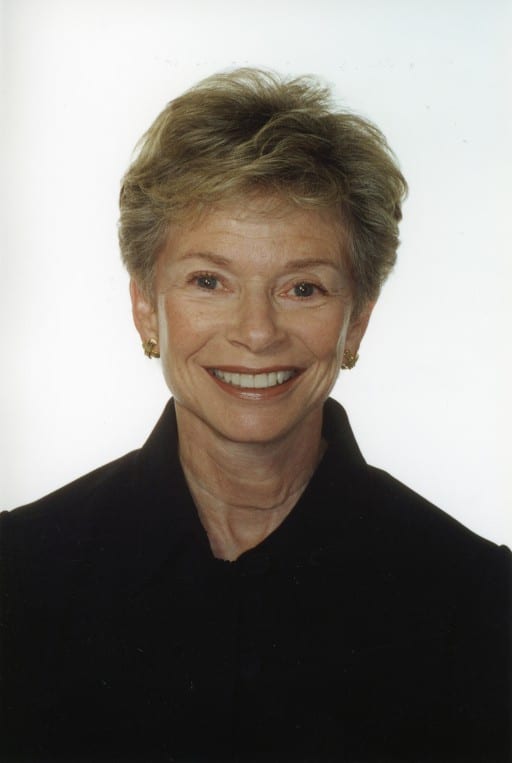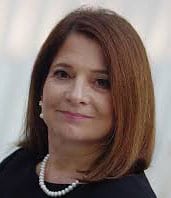

[Editor’s Note: Marilyn Laurie (1939-2013) was a PR pro who worked on the first Earth Day in New York City. This helped her land a position as an environmentalist at AT&T. She switched to PR, moved up the ranks, eventually becoming the company’s first woman CCO. She also was the first female to join AT&T’s executive committee. Shelley Spector, founder of Museum of PR, interviewed Dick Martin, who succeeded Marilyn at AT&T. He is the author of “Marilyn: A Woman in Charge” (PR Museum Press, August 2020.)]

Shelley Spector: What lessons can we glean about women and leadership from Marilyn Laurie?
Dick Martin: All I can do is repeat some of the lessons Marilyn suggested.
The first is triple-barreled and came to her in her final days, as a summation of her path to the top of her field: ‘Have the ambition to influence the future, the courage to stand up for your ideas, and the stamina to make yourself heard.’
Perhaps knowing many people don’t think of [these] as feminine characteristics, she suggested, ‘maintain defiant belief in new possibilities.’ In other words, don’t lean in for the sake of getting promoted. Lean in for the sake of getting something meaningful done.
Spector: Marilyn dealt with more than a few crises at AT&T. Which one do you feel best exemplified her ability to handle crises well?

Martin: In the 1990s, AT&T handled about 80 percent of long distance calls in the US. The company had been in the business for more than a century, and the quality of its service was generally considered excellent. In fact, if someone got a wrong number, they assumed they had mis-dialed and not that AT&T was at fault.
Then on Jan. 15, 1990, the AT&T network stopped working. It just died, and it didn’t come back to life for 9 hours. How Marilyn handled that crisis was typical. She left hour-by-hour management [of the crisis] to her staff because she had empowered her team to update employees and the media in real time. That gave her the space to look at the situation from a much broader perspective.
To her, the network outage didn’t mean people couldn’t make phone calls; it meant they had lost something they thought they could count on. “It was a betrayal,” she said. “And an apology just won’t cut it.” That’s why when the problem was resolved, she persuaded the CEO to brief the media rather than assign it to an engineering VP who understood the nuts and bolts better.
She also pressed for the company to give something back to make its apologies real. From then on, ‘give something back’ joined ‘tell the truth, tell it fast, take responsibility, and fix the problem quickly’ as her rules for crisis management.
Spector: What lessons can young PR pros learn from Marilyn’s climb up the ranks during the 1970s?
Martin: One of the secrets to Marilyn’s success was her ability to come at problems from the perspective of those affected. It was a way of thinking that does not come naturally to most businesspeople, whose success depends on being laser-focused on a small number of goals. In many ways, she provided the company peripheral vision.
Marilyn saw it as her role to be a voice in the boardroom for the company’s employees, customers and the communities in which it operated. She believed that was the value she could bring to the decision-making table, and it was the foundation of how she explained the purpose of PR: ‘to bring the policies and practices of an institution into harmony with the needs and expectations of the public.’ Sometimes that means persuading the public the institution is doing the right thing. At times, it means persuading the institution to change its behavior.
Marilyn believed that purpose is meaningful enough to warrant the exercise of your full capabilities. And as she said, always ‘Choose meaning over busy-ness.’
Spector: You’ve describe Marilyn’s initial struggles at getting AT&T’s all-male leadership to accept her. How did she win the C-suite’s confidence and respect?
Martin: She not only had to disabuse them of gender stereotyping, but she also had to change their perceptions of her job. At best, some thought of PR as free advertising. At worst, some considered it the Department of Being Nice.
Marilyn made it her business to know the business. Reading the trades and business papers was not enough. “Listen deeply to all kinds of audiences—through all kinds of media—so you bring a convincing, uniquely outside perspective to the table,” she said. “A broad understanding of public opinion and trends will bring authority to your advice.”
Of course, providing that advice required one more thing: courage. As she said, “You can’t be afraid. We have to constantly be trying to affect policy, trying to deal with actions that come up, trying to be there before decisions are final—and sometimes change decisions even after they are final. The capacity to relate to operational leaders without fear, as a peer, as a colleague, is very important.”
Marilyn also realized having the authority to exercise that kind of courage had to be earned. She would say, ‘If you have consistently supported the business, brought insights to it, motivated employees, then…you have a chance of being believed when you say, ‘Don’t cross this line. You will be sorry. Not the enterprise in general. You.’’
Spector: What PR background did Marilyn have at the beginning of her career?
Martin: Very little. Marilyn did not join AT&T as a PR pro. She joined as an environmentalist assigned to get employees interested in recycling, from a perch in HR. She moved to PR after she managed to get her job transferred to engineering, which she thought had more clout than HR.
With no interest in engineering or background in HR, she was added to the PR department, but she quickly discovered most of those jobs were moving to New Jersey. She declared she wouldn’t leave New York, hoping to get a separation offer, and was surprised when she was offered a position in media relations, one of the few PR departments staying in New York. The only problem was that she knew nothing about media relations.
Marilyn claimed her success with Earth Day was a fluke. She didn’t even know how to write a news release. So she did what would become a career-long habit; she looked for a hole to fill.
She knew surveys showed that most Americans at the time got most of their news from television. But AT&T had no particular expertise in broadcast news, other than industrial films it had been producing since the 1920s. So she proposed developing a program to teach senior executives how to handle a news interview. That not only started her PR career; it introduced her to all the company’s senior executives (and them to her). And her career took off.
Spector: How did Marilyn’s early years in the Bronx contribute to her success?
Martin: Marilyn once told several of us a story from her childhood that gave me insight into her character.
She said she brought home a report card with all 99s and ‘caught hell” for not bringing home any 100s. Marilyn said it wasn’t pressure, but just what she called the “Jewish cultural belief” that education was the road to a good life. Marilyn’s life would turn out to be a long-running argument with that younger version of herself. Was she trying as hard as she could? Was she as fearless as she could be? Was she as successful as she should be?
Even in elementary school she was on a fast track. She skipped many years of elementary school and got used to always being the youngest in the room. Her sister was seven years older, and there were very few girls in her neighborhood on the Grand Concourse. So, most of her friends were boys.
She never thought of herself in a gender-stereotypical way.
Barnard’s president was the only married woman with kids to lead one of the seven sister colleges. She urged Barnard women to take their time after college, to get started on meaningful careers that might prove a rewarding alternative to married life and motherhood.
Spector: Today it is popular to coach women to ‘bring your whole self to work.’ Do you think Marilyn did that?
Martin: If bringing your whole self to work suggests it’s where she found meaning in her life, that’s almost certainly true. Marilyn’s drive and ambition were at odds with stereotypical notions of female characteristics at the time. This became a source of friction with some of her peers.
At times, even Marilyn’s daughters resented her focus on work. Eventually, as adults, they understood that balancing work and family simply wasn’t a realistic option for someone with their mother’s aspirations. They supported her and believed she should not need to abandon those aspirations simply because she was a woman.
CONTACT: shelleyspector@prmuseum.org
